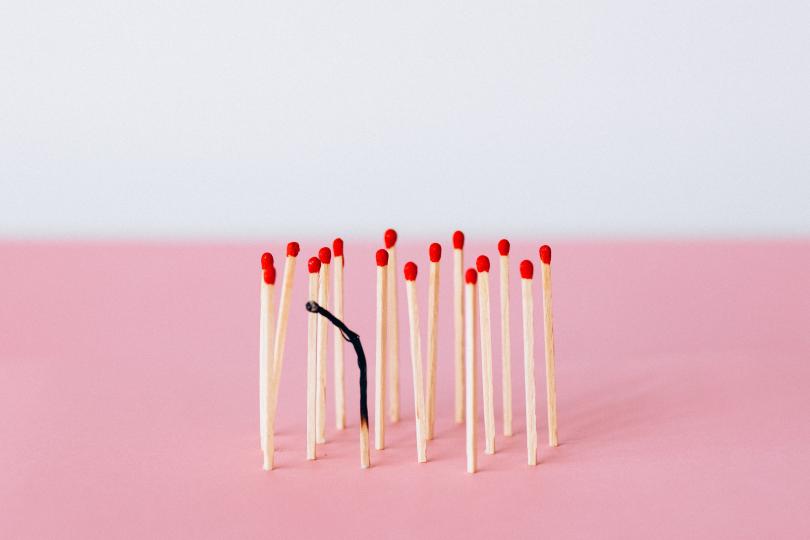Post-Pandemic Theatre Burnout

Burnout (n.) Fatigue, frustration, or apathy resulting from prolonged stress, overwork, or intense activity. That is, “to burn until the fuel is exhausted” (Dictionary.com).
My friend snorted. “Take a break? What do you mean, ‘take a break’?”
I was 22 and just finished my first (and to this day, only) show at the Guthrie, The Master Butchers Singing Club. I was just out of college, working an MLM sales job where crying in the bathroom for eight hours was preferable to actually talking to customers, and I was debating whether quitting my job and living in my car was a better option.
“I’m tired,” I said. “I love theatre, I love acting, but I just need not to do anything right now. I’ll take the holidays off, then I’ll audition in the spring again.”
“Well, okay,” my friend said in the same condescending tone as a parent telling their two-year-old “Sure, honey, you know best.” “Enjoy watching everyone else our age meet people and get ahead. If you really loved theatre so much, you wouldn’t need a break.”
What a lovely sentiment. It’s not that the theatrical institution is flawed or working 14 hours a day is unsustainable or I paid more for parking to work at the Guthrie than the $100 stipend I received – it’s that I simply didn’t love theatre enough.
I’ve felt this need to take a break a few times over the twelve years I’ve been out of school. Most of the time I beat it back with a stick and commit to the next project anyway, but when March 2020 rolled around and the show I was working on was canceled, powering through wasn’t really an option. It was during this time that I – and most of America, it seems – first read about the concept of burnout. This term rose to public awareness in 1974 from psychologist Herman Freudenberger’s observations of nurses working in a free clinic in New York. Freudenberger defined burnout as “becoming exhausted by making excessive demands on energy, strength, or resources,” specifically in the workforce (p. 159). He noted nurses experiencing burnout were irritable, cynical, and susceptible to depression, and the work they were performing often was exhausting and underpaid. The nurses simply were not getting more out of their work than they were putting in. Here is some more on this fascinating study.
Now I’m not sure about you, but I’ve had one or two (or ten) theatre experiences that were unpaid. I’ve had a few where it felt like the stress and effort of my commute, hard work in rehearsal, and time commitment outside of rehearsal surpassed anything I got out of the experience. One that springs immediately to mind included mandatory set build days on weekends, extra responsibilities thrown at cast members last-minute (like giant animal wrangling), and the final dress rehearsal before opening night lasting until 3am.
While most of my theatrical experiences aren’t quite that bad, they still take up a lot of life. I work from 8:30-5:00 five days a week. I find dinner around my house or (more often) stop at the Starbucks near me that knows me by name. I arrive at rehearsal between 6 and 6:30, rehearse until 9 or 9:30, then arrive home just before 10. Then I have two hours to recharge my introvert batteries before tumbling into bed and waking up tomorrow to do it all over again. Working an extra 20 hours a week for 6-8 weeks in a row, followed by 3-4 weeks of performances is bound to wear a person out over time, strain familial relationships, or affect your mental health.
Burnout also applies to the audition process. How many times have you seen an audition post on Playlist and thought it sounded interesting – until you saw the requirements? “Please show up for a two-hour audition; you will be required to stay the entire time. Prepare two monologues, one Shakespearean, one comedic in dialect from a play written before 1960. Wear dancing shoes, there will be movement. Also if you could bring some food for the production team, that would be great. They get peckish around 7:30.”
Now imagine you’ve done all that work (including bringing the production team homemade brownies), and you don’t get cast. Now imagine doing that again. And again. And again. And again. And – bored yet? Going too many auditions without a “win” absolutely contributes to burnout. You are putting every last bit of your energy, strength, and resources into a process that hasn’t refilled your coffer.
So…how do we refill? And more importantly, how do we stay full?
Five Strategies To Cope With Burnout By Me, A Person Who Has Tried All Of These And Sometimes Even Succeeds At Them
- Seek Help. Friends and family can be good sounding boards, but in this case I recommend chatting with a therapist. I will recommend therapy first in almost every situation, because I’ve seen how much it’s helped me. I realize seeing a therapist can be a costly proposition, and isn’t accessible to everyone, but I encourage you to give it a try if it’s within your means. Is it scary? Sure. But I see an art therapist every few weeks, and it has truly changed my life. If you’ve been wondering if you should try therapy, consider this your sign.
- Take a Break. I mean it. It is so damn hard to take a break in this business – actor FOMO is real – but sometimes it’s absolutely necessary. Say you start the year at 100% fuel in your tank. You put up a show in March, and your energy reserves are at 75%. Then you jump right into another production and you go up in July at 50%. By the time you get to your winter production of The Hans Gruber Chronicles: Put That Cop Back Where He Came From Or So Help Me, how much fuel do you think you’ll have left? What does that mean for your performance, your attitude, how you’re treating other people, or how you’re caring for yourself? Unfortunately, surviving on Starbucks lattes and cake pops is not sustainable.
- Ask Yourself What. What do you really want to accomplish with your theatre career? What are your goals? How is Project X going to help you achieve those goals? Is it worth it to you to take an ensemble role with a larger theatre to build those connections and work with a great director, or is it not? Do you want to try directing? What about playwriting? I have a few friends who audition for anything and everything, and they work more often than I do. While they do have talent, theatre also is a numbers game – the more you audition, the more likely it is that you will be cast. What my friends want from their careers is to work as often as possible, and that’s great. I had to have a hard sit-down with myself earlier this year and realize that isn’t what I want. I did that in my 20s, and it was a hell of a rollercoaster, but that doesn’t serve me anymore. Now, I want to be more selective – to choose projects that tell the kinds of stories I want to tell, that introduce me to exciting directors, that provide meaty female roles, that pay me to be there. This means I’ll be working less than I’d like, but I’m confident it means every project I do say “yes” to will be more meaningful (with much less spontaneous giant animal wrangling).
- Just Say No (to things). Once you’ve figured out the “what,” you get to start saying “no” to any opportunity that doesn’t fit the “what.” Fantastic! I’m absolutely terrible at this part. Through therapy, it’s become evident that I have a bit of a complex around being “chosen,” making those times when an audition doesn’t go my way more difficult on my mental health than I’d care to admit. This means when an opportunity does come my way, when I’ve been chosen, it is nearly impossible for me to say no. When I have managed it, though, I’m confident it’s been the correct decision. Being chosen is a fleeting jolt of self-confidence. Driving 2 ½ hours a day for no pay to hold a cardboard tree and sing background is not worth that one moment of joy.
(I do acknowledge that for folks attempting to act or direct or achieve another theatre dream as a career, saying no to any paying job might not be an option. I’m not attempting to do that – I have a corporate job – so if you are, feel free to ignore this point).
- Finally, Try Something Else. Theatre requires a number of creative and analytical muscles – memory, empathy, being nice to That One Guy who was cast because he was the only guy who showed up. Try picking up a hobby that requires exactly none of those things. I enjoy junk journaling, an odd name for a type of scrapbooking. I think of a word or place or feeling, then search my ever-growing stack of scrapbook paper and stickers and washi tape for items that fit that word. I use those items to create a kind of collage on the blank page of a notebook, write the word on the bottom of the page next to a cat sticker, and close the journal for the day. It’s a great way to be creative without being creative, and it’s fun to look back at old pages of the journal as a type of chronicle of how I’ve been feeling the last year. You might pick up an instrument, learn how to play tennis, complete the Pokédex, experiment with new recipes, or learn how to change the oil in your car. Maybe you enjoy coloring books or word journaling or gardening. Maybe it’s time to focus on your physical health – I recently joined a gym, and against all odds I’m actually enjoying it (it’s in print now, so it must be true).
I’d be remiss if I didn’t close by mentioning one of the resources that’s helped me the most, both through my artistic and professional burnout. In their fabulous book Burnout: The Secret to Unlocking the Stress Cycle (Ballantine Books), Emily Nagoski, PhD and Amelia Nagoski, DMA detail several ways to “fight back” against the cycle of burnout. Though the book was written for people who were born female/socialized as women, I related to it as an artist also. There are also societal stresses and pressures around being an artist (the default question seems to be, “What are you doing next?” Sutton Foster could actively be accepting a Tony Award and someone certainly would ask, “Sutton, what are you doing next?”). Many artists also experience “Human Giver Syndrome,” where they are expected to give up their entire humanity to others so the others may live life more fully (p. xiii). One line I highlighted with grand vigor was, “Human givers must, at all times, be pretty, happy, calm, generous, and attentive to the needs of others. …Givers are not supposed to need anything” (p. xiii-xix). If that sounds as much like you as it does me, I’d recommend giving this book a read.
“If you really loved theatre so much, you wouldn’t need a break.”
I would love to go back to that friend and say, “Actually, it’s because I love theatre so much that I do need a break. It’s like taking paid time off from a corporate job, or a solo vacation weekend away from your family. You don’t do it because you hate your job or your family (I hope) – you do it so you can come back to them your best self. So you can come back fully energized and ready to tackle the next project or need with the empathy and clear-headedness it requires. You take a break so you can come back.”
I don’t know that they would have listened. But I sure would have felt better. And if you’re also experiencing burnout right now, you’ll feel better too, someday soon. Every storm runs out of rain.
References
Freudenberger H. J. (1974). Staff burn-out. Journal of Social Issues, 30, 159-165.
Nagoski, Emily and Amelia Nagoski (2019). Burnout: The Secret to Unlocking the Stress Cycle. Ballantine Books, New York.




